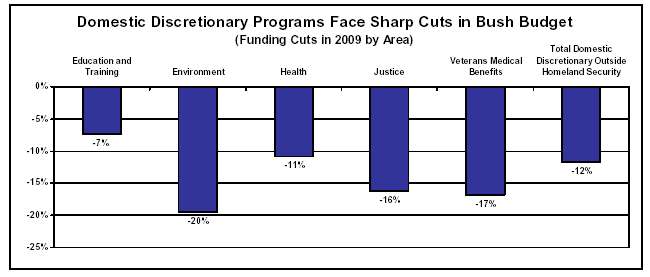| NEWS RELEASE __________ |
|
|||
| 820 First
Street, NE Suite 510 Washington, DC 20002 Tel: 202-408-1080 Fax: 202-408-1056 [email protected] www.cbpp.org
Robert Greenstein Iris J. Lav Board of Directors
David de Ferranti, Chair John R. Kramer, Vice Chair Henry J. Aaron Ken Apfel Barbara B. Blum Marian Wright Edelman James O. Gibson Beatrix Hamburg, M.D. Frank Mankiewicz Richard P. Nathan Marion Pines Sol Price Robert D. Reischauer Audrey Rowe Susan Sechler Juan Sepulveda, Jr. William Julius Wilson |
DEEP, WIDESPREAD CUTS IN
DOMESTIC PROGRAMS OVER
Under the Administration’s budget, overall
funding would be cut over the next five years in nearly every broad area of
the federal budget related to domestic non-entitlement programs, according to
a new analysis from the Center on
By 2009, funding for non-entitlement programs in areas such as national resources and the environment, veterans’ health benefits, health, and agriculture would be 10 percent to 20 percent below the 2004 funding levels, adjusted for inflation. Transportation programs, as well as education, training, and social services programs, would be cut by 7 to 8 percent over this period. The proposed cuts are so large, an accompanying Center report shows, that by 2009, total funding for domestic non-entitlement programs outside homeland security would fall to its lowest level, measured as a share of the economy, since 1963. Spending Cuts Would Help Finance Tax Cuts, Not Shrink Deficit While the budget proposes significant cuts in domestic non-entitlement programs, the resulting savings would be small as a share of the budget because these programs make up only one-sixth of the overall federal budget.
Moreover, the Office of Management and
The report concludes that deficit-reduction efforts of the type instituted in the late 1980s and 1990s are again needed. Those earlier efforts, the report notes, involved shared sacrifice and coupled restraints on discretionary programs with tax increases — especially on those who could most afford them — and entitlement reductions. By contrast, the report finds, the Administration’s budget “singles out domestic discretionary programs and the people they serve for cuts of considerable depth while seeking to confer yet more lavish tax cuts on those who are most well-off.” “This budget doesn’t represent a serious effort to address our mounting fiscal problems,” said Center Executive Director Robert Greenstein. “Nor does it provide equitable treatment to the various parts of the federal budget or Americans of different income groups.” Proposed Spending Caps Would Enforce Cuts
The proposed cuts for years after 2005 have
received little attention because the Administration omitted the budget
levels after 2005 for all budget accounts from the budget volumes it issued
on February 2. For a number of years, these figures have been a standard
part of the budget books made widely available to the media and the public.
The proposed cuts for years after 2005 can be found only in a more technical
1,000 page budget document that OMB has provided to the House and Senate
Nevertheless, these proposed cuts should be taken seriously because the Administration also is proposing five-year, legally binding “caps” on overall funding and spending levels for non-entitlement programs. Caps for each of the next five years would be set at exactly the overall amounts the Administration is proposing for non-entitlement programs in each such year, thereby locking in cuts of the magnitude that the Administration budget document shows. Cuts Would Affect Vast Majority of Domestic Programs By 2009, total funding for domestic discretionary programs outside homeland security would be cut $49 billion — or 12 percent — below the 2004 funding level, adjusted for inflation. Such cuts entail reductions in the levels of service these programs provide. The proposed cuts include:
Some domestic non-entitlement programs would receive funding increases in fiscal year 2005 (which starts on October 1, shortly before the elections). However, nearly all of these programs would be cut starting in 2006. This includes most programs for which the Administration is touting its proposed increases for 2005, such as special education for children with disabilities, research at the National Institutes of Health, and the WIC program. # # # # The Center on Budget and Policy Priorities is a nonprofit, nonpartisan research organization and policy institute that conducts research and analysis on a range of government policies and programs. It is supported primarily by foundation grants. |
